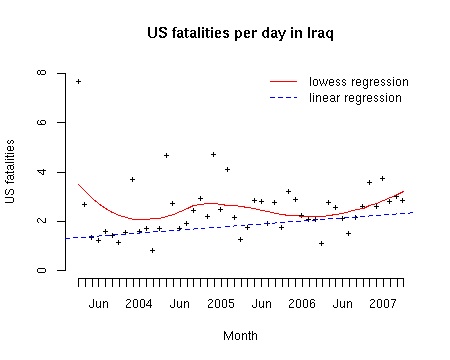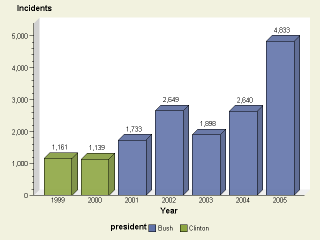Okay, mistakes were made. But four years into the war in Iraq, things are getting better, right? Josh Rosenau looks at the trends:

Err… not so good. Well, at least terrorism is down, right? From Daily Kos:

There are always birth pangs. But things are looking up for the future of Iraq, right?
Hundreds of thousands of children no longer attend school. Others have been forced from their homes to camps, while others have fled the nation with family.
For those that remain behind, there is the constant fear of being killed and the mental toll that warfare takes on its most vulnerable victims.
“Our children are surrounded by violence,” said Dr. Saied al Hashimi, a professor of psychiatry at Baghdad’s Mustansriya University. “Most of them are traumatized.”
He says mass displacement, the death and murder of family members and the constant presence of heavily armed troops, militias and death squads have a long-term impact on the children, especially those in and around Baghdad where violence is most intense.
“I call them the silent victims. Our Iraqi children are the silent victims,” he told CNN.
Our military is strained:
Four years after the invasion of Iraq, the high and growing demand for U.S. troops there and in Afghanistan has left ground forces in the United States short of the training, personnel and equipment that would be vital to fight a major ground conflict elsewhere, senior U.S. military and government officials acknowledge.
More troubling, the officials say, is that it will take years for the Army and Marine Corps to recover from what some officials privately have called a “death spiral,” in which the ever more rapid pace of war-zone rotations has consumed 40 percent of their total gear, wearied troops and left no time to train to fight anything other than the insurgencies now at hand.
Sure hope nothing unexpected happens:
For decades, the Army has kept a brigade of the 82nd Airborne Division on round-the-clock alert, poised to respond to a crisis anywhere in 18 to 72 hours.
Today, the so-called ready brigade is no longer so ready. Its soldiers are not fully trained, much of its equipment is elsewhere, and for the past two weeks the unit has been far from the cargo aircraft it would need in an emergency.
Instead of waiting on standby, the First Brigade of the 82nd Airborne is deep in the swampy backwoods of this vast Army training installation, preparing to go to Iraq. Army officials concede that the unit is not capable of getting at least an initial force of several hundred to a war zone within 18 hours, a standard once considered inviolate.
E.J. Dionne says the war has changed the way we think:
To understand how much the Iraq war has transformed the way most Americans think about foreign policy, consider what passed for shrewd analysis four years ago.
The words on the “in” list included “unilateral,” “bold,” “robust,” “transformative” and “sole remaining superpower.” The words on the “out” list included “multilateral,” “nuance,” “patience,” “diplomacy,” “allies,” “history” and “prudence.”
Today, the “in” and “out” lists would be almost exactly reversed. The new “out” list includes such additions as “reckless,” “arrogant” and “incompetent.”
…
Foreign policy hawks fear an “Iraq Syndrome” involving a pathological wariness about the use of American force and an unhealthy mistrust of every word coming out of the White House.
On the contrary, this botched war is far more likely to lead to what might properly be called the Post-Bush Awakening. It is an awakening to the danger of viewing critics as traitors, to the costs of making everything about politics and to the sad tendency of establishmentarians to seek refuge within the boundaries of prevailing opinion.
It is also an awakening to the wise skepticism of everyday Americans toward ideologues who believe that optional wars of their design can miraculously change the world.
I hope it’s not cockeyed optimism to hope that one good thing might come out of the Bush presidency: an utter rejection of Bush and his policies.




